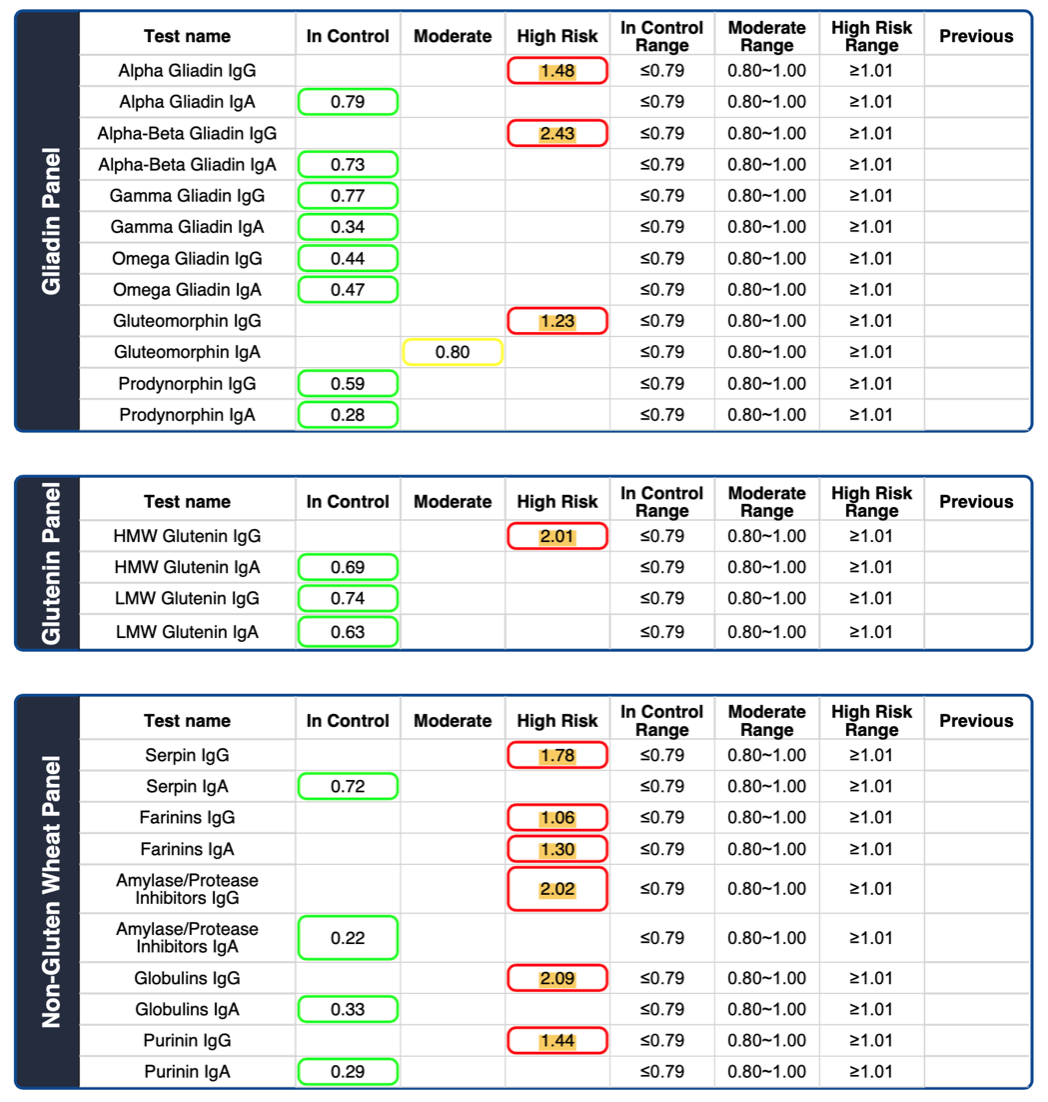
Gluten Sensitivity
Gluten is a complex protein. It is a BIG protein made up of a lot of peptides, not a singular entity that is easy to assess. It is not digestible by humans and can create a real mess for many. It is primarily found in wheat, barley, and rye. This also extends into spelt and sourdough bread. Wheat protein is massive and Gluten is one component of wheat protein.
AUTOIMMUNITY: The big concern that is always associated with Gluten is Celiac Disease. It is the one autoimmune condition that everyone thinks of and what most doctors are familiar with. What is not commonly understood is its connection with autoimmune thyroid, skin, and nervous system conditions. These can have much more significant consequences for the individual. It is also a major contributor to intestinal permeability (“leaky gut”) that can lead to other food sensitivities and immune system activation that results in body-wide inflammation.
TESTING: Testing for gluten sensitivity has some flaws. The testing for Celiac Disease, for example, is looking at one specific portion of Gluten, the Gliadin peptide. Many food sensitivity tests, including a popular one now circulating around on social media, are often only looking for antibodies against the larger protein or one of its peptides (alpha-gliadin), and these are usually only IgG testing, which has further limitations. A negative test does not actually exclude a gluten sensitivity and you cannot rely on that as definitive. Here’s why…
PERSONAL STORY: I have personally tested “Negative” for gluten sensitivity on multiple different food sensitivity panels over the years. I have always found this interesting because I can usually tell within about 20 minutes whether I’ve been exposed to it. I first identified my issues with this protein in 2012 when I did an elimination diet (Paleo) and discovered the symptoms that disappeared with its absence and then dramatically returned on its reintroduction. I did not really need a test to tell me that it was an issue for me but I was stumped by the normal tests. This panel (see below) has confirmed what I always suspected. I apparently also have reactivity to other portions of wheat that are not part of the gluten protein.

WHERE IS IT? We hear so much about it now that it has become a common household word and it seems like it is such a simple thing to grasp and understand. Wanna avoid gluten? Don’t eat bread, pasta, pastries, or wheat cereal. Simple, right? Not so much. You see, wheat is also used as an additive to many other foods and condiments (eg, most Asian sauces, some mustards, Worcestershire sauce, some ice creams, dried spice blends, malt vinegar, and others). Many restaurants add wheat to soups, stews, gravies, and sauces and may even do it without knowing it (using the above sauces or seasonings). Deep-fried foods, breaded foods, and other cross-contamination can also be an issue. Gluten is hidden in many foods with fancy code names. It is not always spelled out for you. Many food companies are not always very forthcoming with their secret recipe of “Natural Ingredients”.
DO YOU NEED TO AVOID GLUTEN? Maybe.
- If you have an autoimmune condition that is aggravated by it you should definitely consider avoiding it.
- If you don’t but do experience symptoms with it you may want to minimize it. You’d be amazed how many of your symptoms and conditions it can be contributing to.
- Many who start following a “Gluten-Free” diet do it to lose weight, not because they believe their body actually has an issue with it. It has become somewhat of a fad. Interestingly, the reason for the weight loss may not be simply because you have eliminated all the excess processed carbs found in gluten-containing foods, though this does not hurt. Inflammation can lead to weight gain and obesity. Gluten can create an inflammatory response that leads to this. Removing it results in less inflammation, improved immune function, less cortisol release, and improved metabolic function. Not everything is as obvious as it seems.
- There are no chronic medical conditions or symptoms (e.g., headaches, brain fog, palpitations, mood disorders, insomnia, joint pains, muscle aches, fatigue, abdominal bloating or pain, acid reflux, skin rashes) that may not improve with gluten elimination or eating it on a limited basis. Try it!
Interested in knowing more or having testing done for yourself? We’re happy to help. We offer consultations & functional lab testing that can help identify many of the root causes that can be contributing to your symptoms. Knowledge is power and can help you to finally start feeling your best.
